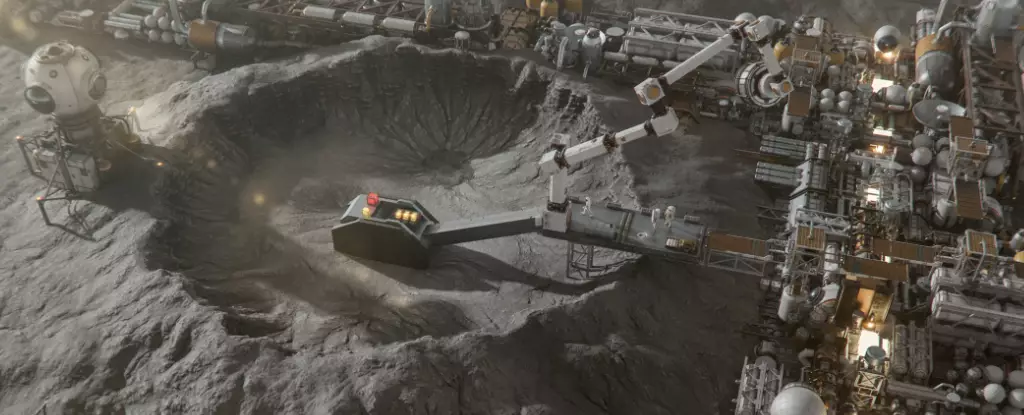As we stand on the brink of what could be a revolutionary decade for lunar exploration, the Moon has transitioned from a distant celestial body to a tantalizing frontier for human endeavor. The advancements in technology and interest from both nations and private corporations signal a burgeoning commercial wave targeting the Moon’s rich resources. The questions that arise are not merely about the resources themselves—such as water ice, rare earth metals, and potential fuel sources—but about the ethical frameworks we need to establish to guide such endeavors safely and responsibly.
While NASA’s Artemis program aims to not only land astronauts on the lunar surface but also facilitate mining operations, countries like China are simultaneously advancing their lunar ambitions. This frenzy for lunar resources is igniting a new space race, with private enterprises vying to stake their claims on the Moon’s riches. Although these endeavors promise tremendous advancements, they necessitate a keen examination of the rules and regulations required to govern our activities on this celestial body.
One of the pivotal motivations for lunar mining is the high cost of transporting materials from Earth to space. This imbalance makes basic necessities, like water, incredibly expensive—often fetching prices that surpass those of precious metals. However, utilizing lunar water ice to produce hydrogen and oxygen can provide critical resources right where they are needed, thereby reducing costs for longer missions deeper into space, including potential journeys to Mars.
Moreover, the Moon’s mineral wealth could alleviate some of the pressures Earth faces regarding dwindling natural resources. Rare earth metals essential for modern technology, from smartphones to renewable energy solutions, could come from lunar extraction, potentially transforming the economics of various industries. Yet such endeavors raise important questions about environmental practices on the Moon, specifically regarding the dust created during mining activities. Without an atmosphere to mitigate disturbances, lunar dust can travel vast distances, impacting the Moon’s appearance and possibly its environmental balance.
While existing international accords, such as the Outer Space Treaty of 1967 and the 1979 Moon Treaty, establish that no nation can ‘own’ celestial bodies, the commercialization of resources on the Moon puts this framework to the test. The 2020 Artemis Accords introduce provisions that could permit mining activities while still upholding principles from earlier treaties. However, interpretations of these agreements may create legal gray areas that need to be addressed proactively.
As we delve deeper into this unknown territory, we must emphasize that any benefits derived from lunar extraction should be shared among all nations, particularly those unable to access space mining technologies and capabilities. This discussion extends beyond sheer economic benefit; it touches upon the moral obligation to ensure equitable access to the Moon’s resources.
In the midst of all the enthusiasm surrounding lunar mining, a glaring concern looms—worker safety and rights. As we dream about exploiting lunar resources, we must not forget the realities of labor in such extreme conditions. Challenges such as cosmic radiation exposure, psychological stress from isolation, and the potential for harsh work environments could create significant health risks for lunar miners.
Charles S. Cockell, a British astrobiologist, highlights a perilous scenario where vulnerable workers might find themselves under the thumb of powerful individuals without any means to challenge unsafe or unfair working conditions. The structural risks associated with lunar jobs could lead to abuses reminiscent of labor exploitation on Earth, yet with fewer means of escape or rights protection.
Creating a regulatory framework that safeguards workers is not merely an aspirational goal; it is a critical component of ensuring that lunar mining operations uphold human dignity and fairness, even beyond our planet. Thus, it falls on existing regulatory bodies and new initiatives to develop comprehensive labor laws that bridge the gap between Earth and lunar operations.
The Moon beckons with promises of advancement and resources that could enrich humanity and support future exploration. However, history repeatedly warns us of the repercussions of unregulated exploitation. As we prepare for lunar mining, we must prioritize the establishment of robust regulations that safeguard human rights, worker welfare, and environmental balance. Ensuring that we respect the Moon as a precious shared heritage will not only determine the success of our endeavors but will also set a precedent for ethical conduct in outer space, shaping the future of humanity’s journey across the cosmos.


Leave a Reply